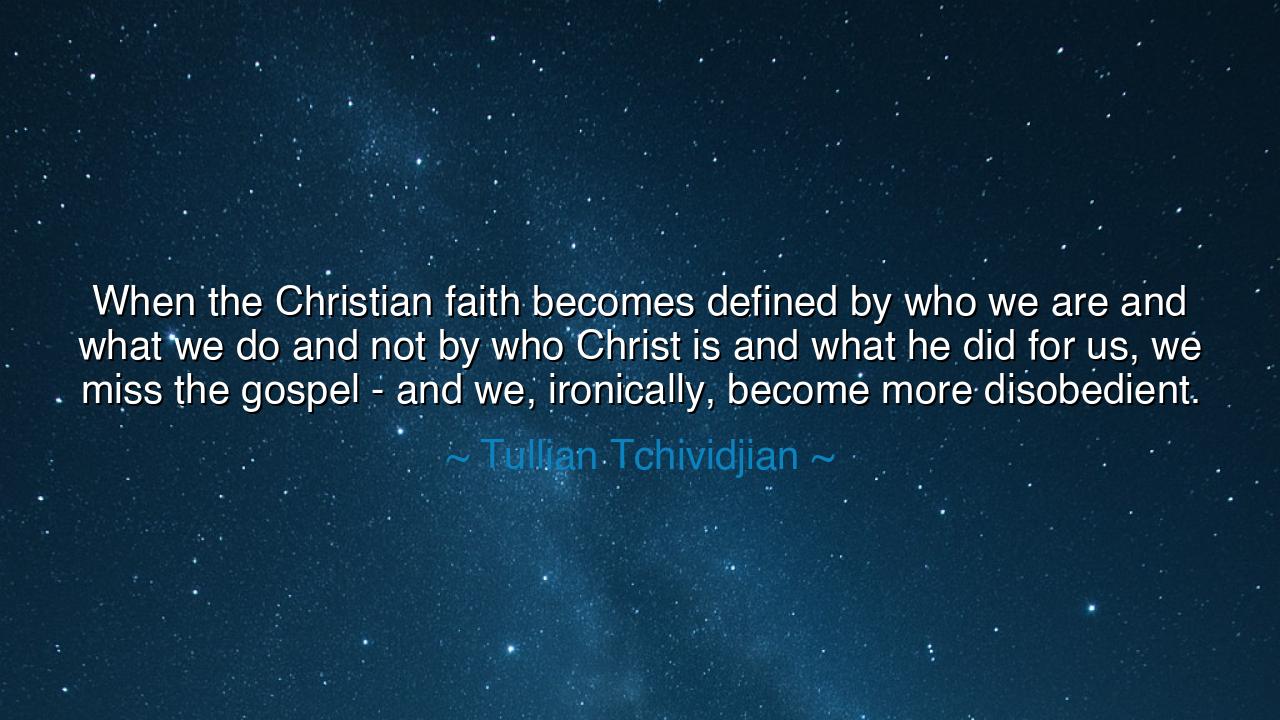
When the Christian faith becomes defined by who we are and what
When the Christian faith becomes defined by who we are and what we do and not by who Christ is and what he did for us, we miss the gospel - and we, ironically, become more disobedient.






Host: The room was quiet, the soft flicker of candlelight casting a gentle glow across the space. Jack sat near the window, his fingers resting on the armrest, his gaze lost in thought. Jeeny, across from him, sat with a cup of tea in her hands, her attention focused inward. The stillness between them felt like the perfect moment to reflect on deeper ideas about faith, identity, and what truly defines us.
Host: Tullian Tchividjian’s words filled the room: “When the Christian faith becomes defined by who we are and what we do and not by who Christ is and what he did for us, we miss the gospel - and we, ironically, become more disobedient.” The simplicity and depth of the statement seemed to open up a conversation about grace, identity, and the danger of losing sight of the true essence of the gospel. Jack, always thoughtful about the intersection of faith and action, was the first to speak.
Jack: His voice was thoughtful, almost with a hint of regret: “I think what he’s getting at is really important. When we start defining our faith by our own actions, by what we do or don’t do, we miss the core of it. The gospel isn’t about us—it’s about Christ and what he’s done for us. When we make it about us, we lose the power of grace, and ironically, we end up being more focused on performance than on the relationship we’re called to have with Christ.”
Jeeny: She nodded slowly, her voice gentle, but filled with insight: “Exactly. It’s so easy to get caught up in the idea that our faith is about what we can achieve, about how good we can be, how well we can follow the rules. But when we focus on that, we end up missing the gospel—the good news that our salvation isn’t based on what we do, but on what Christ has already done for us. The danger is that when we make faith about our own actions, we not only miss the true message, but we actually become more focused on ourselves and less on Christ.”
Host: The room seemed to grow a little heavier, as though Tchividjian’s words had uncovered a deeper understanding about the nature of faith and grace. The realization that obedience and faithfulness in the Christian walk come not from striving to prove our worth, but from resting in what Christ has already done, seemed both freeing and profound. Jack, who often took a more practical view of life, seemed to reflect on how easy it is to get lost in the idea of performance and forget the true meaning of grace.
Jack: His voice softened, almost reflective, as he continued: “Maybe that’s the point—when we focus too much on our own efforts, we end up getting further away from Christ. The gospel isn’t about us being good enough or doing enough; it’s about Christ’s sufficiency. Our obedience doesn’t come from trying harder; it comes from knowing that Christ has already fulfilled the law on our behalf. When we make it about our actions, we miss the very essence of what makes faith so powerful: it’s Christ’s work, not ours.”
Jeeny: Her smile deepened, her voice reassuring, filled with peace: “Exactly. The beauty of the gospel is that it’s not about us getting everything right—it’s about grace and what Christ has already done. When we start making it about our own actions, we become burdened by trying to meet an impossible standard, and that only pulls us further away from the heart of the gospel. True obedience comes from resting in His finished work, not from striving to be perfect.”
Host: The room grew still, as though the weight of their words had settled into something meaningful. The realization that faith, at its core, is about receiving rather than performing, about embracing grace rather than striving for perfection, felt like a profound shift in understanding. Jack and Jeeny sat together, realizing that obedience in faith isn’t about achieving something—it’s about trusting in what Christ has already done and letting that transform us from the inside out.
Jack: His voice, now gentler, seemed almost resolved: “Maybe that’s the real power of the gospel—it’s not about what we can achieve; it’s about what Christ has already achieved for us. When we rest in that, we’re free from the burden of trying to prove ourselves and can live in true obedience.”
Jeeny: She nodded, her voice full of affirmation, filled with peace: “Exactly. The gospel frees us from the need to perform, to measure up. It’s about knowing that Christ’s work is enough, and it’s in that freedom that we find true obedience—one that flows from gratefulness and trust, not from striving.”
Host: The evening continued, but the world outside felt distant now. Inside, Jack and Jeeny sat in the quiet understanding that true obedience and faith come from embracing what Christ has already done for us—not from our efforts or performance, but from resting in grace. The gospel is not about striving to prove our worth; it’s about receiving the gift of what has already been done and letting it shape and transform our hearts.






AAdministratorAdministrator
Welcome, honored guests. Please leave a comment, we will respond soon